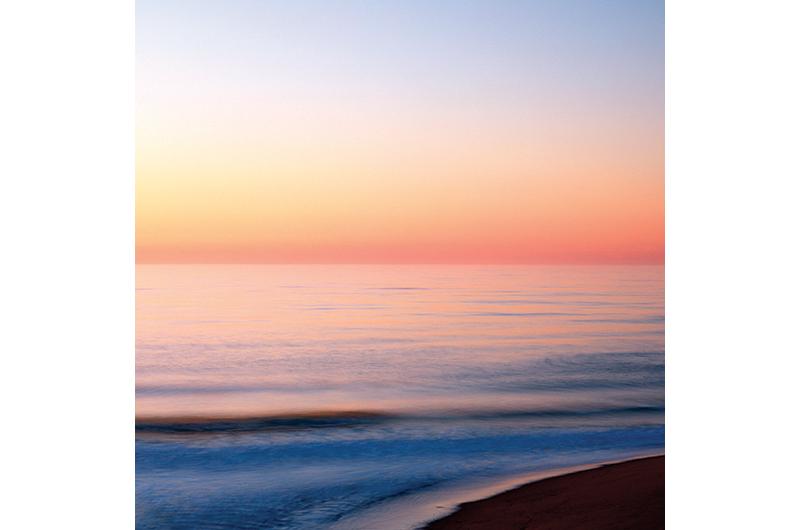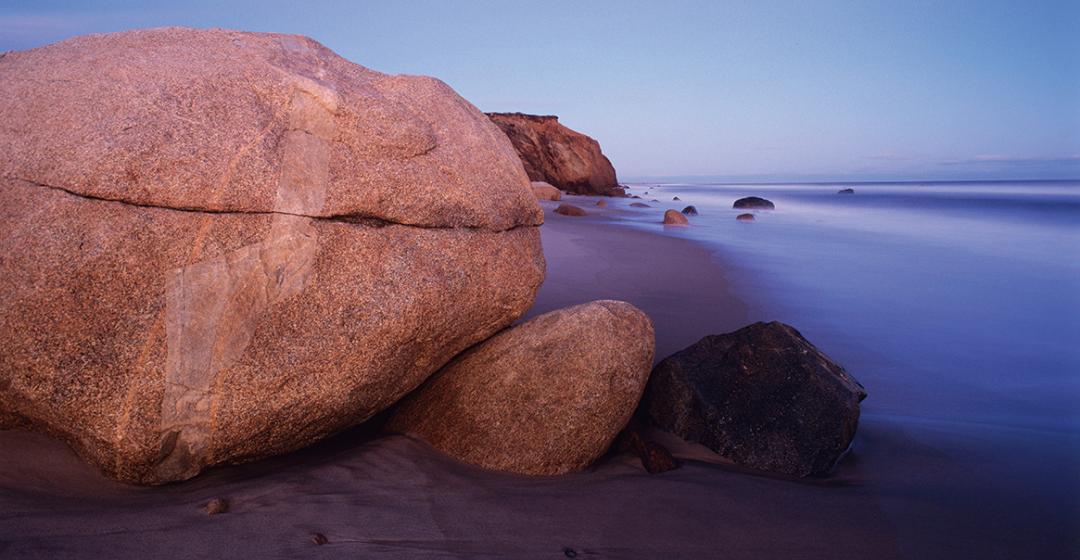The day was unusually calm and clear as the three of us cast our lines, trying our luck in an endless flat sea.
Admittedly, the conditions were all wrong for finding striped bass. Wind, clouds, and a dose of rain would have been nice. Stripers love snotty weather. Yet no one was talking about quitting. Regardless of whether there were fish around, the three of us relished any opportunity to be on this rugged stretch of shoreline. We simply could not get here very often. Totally untamed, it is a place of haunting beauty; the kind of spot some folks dismiss as too desolate. Fine by us. Once you make the hike in, nine times out of ten you have this magnificent chunk of coast all to yourself. Even the locals tended to avoid the place, calling a trek in here “a trip to the moon.”
An hour slipped by. Nothing doing. Out of the corner of my eye I saw Fred climb down off a rock and wade back ashore. Picking up his gear bag, he began walking west. He did not have to explain his actions; Phil and I knew what he was up to. When the fishing is slow, we always employ the same strategy. We keep leapfrogging down the beach, passing one another, covering as much territory as possible in an effort to locate the action – a tactic that works more often than not. Phil and I continued to cast, but a few minutes later, Phil jumped ship too. Like Fred, he disappeared, seeking greener pastures.
I was in no hurry to move. I wanted to drink in the solitude of this beach.
Before me stretched a calm sea, mirroring a cloudless sky. The late afternoon air was soft, crisp, and clean – the visibility unlimited. Sweetening the mix, the pocket of emerald water in front of me looked very fishy. Striped bass ought to be here.

Another twenty minutes passed. What if Fred and Phil were around the next bend, hooking striper after striper? I couldn’t let that happen. I would never live it down. I climbed off my rock and hit the trail too, not wanting to miss out on anything – or fall too far behind.
Crossing the stony beach, I set off down the shore into lengthening shadows. The sun had dropped low in the northwest, behind the escarpment. The afternoon grew cool and crystalline. I neared the next point of land, and as I did, an island appeared on the horizon. With each step, it inched further into view, emerging slowly from behind the dark outline of the headland.
The island was an uninhabited sliver of the world the Algonquin called “Cappoaquit,” though today a map would label it Noman’s Land. I had seen it, from afar, on countless occasions. Yet never before had I caught it in just this light. Framed by the intense blues of the surrounding sea and sky, the island was afire – its steep sides burning with the yellow-orange light of late day. With the sun gone from view, the distant island seemed to be the source of its own illumination, as if the stones and the soil were themselves incandescent, fueled by some intense inner light. It looked strangely alive. Otherworldly.
Stopping in the shadows, I stared, and as I did Noman’s Land moved forward – monolithic, mysterious, radiating toward me. There were three miles of open water separating me from the island, but my eyes insisted otherwise. The island had grown and the gulf narrowed. Enhanced by the pellucid air and powerful pull of warm and cool colors, it was an illusion, like the size of the full moon upon rising. Nevertheless, it was a stunning mirage – arresting, incredibly real, and relentless. My impulse was to shake the thing off, to turn away, to remain in the realm of reason. Yet in the same breath I found myself irresistibly drawn to it. My eyes fixed on the island; my field of vision narrowed. And the longer I looked, the larger Noman’s Land loomed. The island was now immense. With amazing clarity, I saw its craggy cliffs towering from the sea, amber in the waning light – their scarred faces covered with gullies carved by centuries of wind and rain. At the base of the cliffs, massive boulders sat scattered about, each one cupped in a ring of deep shadow. Captured by the yellow light, they were gigantic hunks of gold on the shores of El Dorado.
Riding over the water, the island shimmered. Time slowed. The trance deepened. And I began to feel the isle beckoning me. Spellbound, I was taken there, transported effortlessly over the sea to this talismanic land. I walked the bright beach, bathed in its warm, radiant light as sea foam ran up and hissed around me. Alone I continued on this unknown shore, casting over waves soaked with the fires of sunset. Farther and farther I went, farther and farther into
an ethereal world.
Later, how much I could not exactly tell you, I found myself looking down at the dark and stony shore beneath my feet. My weight on the rocky ground was infinite, fused to the earth by the grip of my steel cleats. In a rush, I lifted my gaze back to the island. It was too late. The spell was broken; reality had returned. And with it a sense of spirituality swept over me. I felt an enormous bond with the earth. I was at peace with our precious planet.
I moved down the rocky shore, all the while thinking about what had just transpired. For a brief moment I had viewed the earth from the edges of consciousness – from a primordial realm where intellect and imagination are free to merge. Likely, our earliest ancestors perceived the landscape in this same way – as an endless source of wonderment, mysticism, and survival. I think everyone who fishes and loves remote places has – at least once – felt it happen. Without warning you find yourself staring at the land – or the sea – or the sky. And when you do, the earth engages you in an ancient dialogue. And for a time, you are lost in the wild.





